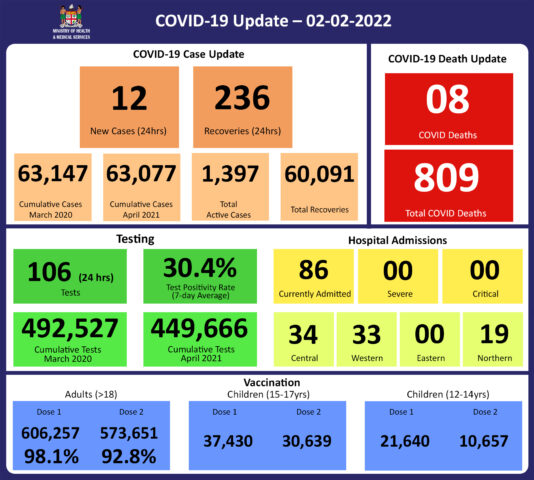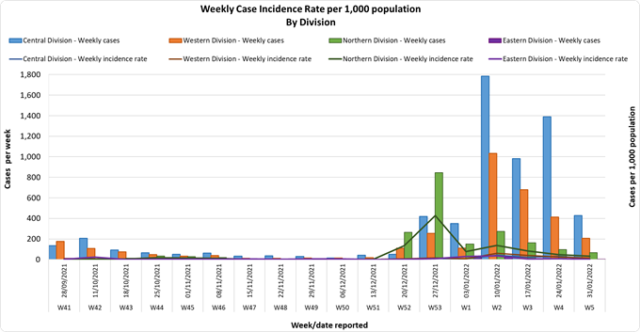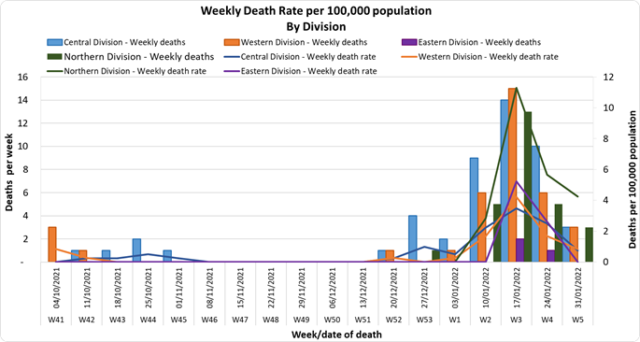COVID-19 Update 02-02-2022
COVID-19 Situation Update
Wednesday 02nd February 2022
| Transmission Update:
Since the last update, we have recorded 95 new cases of which 83 new cases were recorded on 01/02/2022 and 12 new cases in the last 24 hours ending at 8 am this morning. Of the 95 cases recorded, 88 cases were recorded in the Central Division; 4 cases were recorded in the Western Division, 3 cases were recorded in the Northern Division, and nil case was recorded in the Eastern Division. The national 7-day rolling average of cases as of 29th January is 107 daily cases. In the 7 days until 01/02/2022, 436 new cases were recorded in the Central division, 127 new cases in the Western division, 2 new cases in the Eastern Division, and 54 new cases in the Northern Division. The Central Division cases constitute 68% of the cumulative total cases nationally, with the Western division making up 28%, 3% in the Northern Division, and 1% in the Eastern Division. |
||||||||||||||||||||||||||||||||||||||||||||||||||||||||||||||||||||
| Deaths:
This curve depicts the weekly death rate by division since October 2021. Overall, as of the week of 17/01/2022, the death rate graph indicates an upward trend in the number of COVID-19 deaths in the Central, Western, Eastern, and Northern divisions. Please note that notifications of deaths in the week of 24/01/22 are still being received and the week of 31/01/22 (this week) is not yet complete, therefore the appearance of a downward trend on the graph from the week of 24/01/22 may not be accurate. There are deaths from the Western Division currently under investigation for the same time period, therefore the rate for that division may increase. Analysis of Deaths in the Third Wave Table 1: Death rates by Division
An analysis of the 113 deaths recorded in the third wave shows that, while the Central Division has the highest absolute number of deaths, the Northern Division has the highest rate of death when adjusted for population. (Note: There are deaths currently being investigated from the Western Division for the same time period, therefore the rate for that division may increase). Table 2: Deaths by Age Group
For the 113 deaths in the third wave, the rates of death when adjusted for population, have been highest in the age groups 50 and upwards. The 6 deaths from the under 19 age group were in children with significant underlying medical conditions. Table 3: Deaths by Vaccination Status
Out of 113 COVID -19 deaths reported in the third wave, four deaths were in the population not eligible for vaccination (under age 12). An analysis was done for the 109 deaths in the vaccine-eligible population. When adjusted for population in the fully vaccinated (received 2 doses) and unvaccinated/not fully vaccinated (received 0 doses or only 1 dose) adults in Fiji, we can see that death rates per 100,000 population are 8.0 deaths per 100,000 for fully vaccinated adults and 137.0 deaths per 100,000 for unvaccinated adults. This means that unvaccinated adults in Fiji have been dying from COVID-19 at a rate 17.1 times higher than fully vaccinated adults during this current wave. Individuals in the 12-17 age group who died were not vaccinated. There have been no deaths in individuals who received a booster (3rd dose) of the vaccine. New deaths to report There are 8 new COVID-19 deaths to report from 27th January -1st February 2022. All 8 deaths reported today were from the Central Division with one being below the age of 12 years, an age group not eligible for vaccination. The first COVID-19 death to report is of a 72-year old female from the Central Division, who was admitted at the CWM hospital on 14/01/2022. Sadly, she succumbed to death on 20/01/2022. She was fully vaccinated. The second COVID-19 death to report is of a 39-year old female from the Central Division, who died at home on 23/01/2022. She was fully vaccinated. The third COVID -19 death to report is of a 41-year old female from the Central Division, who was admitted at the CWM hospital on 10/01/2022. She had significant pre-existing medical conditions which contributed to the severity of her illness. Sadly she succumbed to death on 27/01/2022. She was fully vaccinated. The fourth COVID-19 death to report is of a 71-year old male from the Central Division, who was admitted at the CWM hospital on 13/01/2022. He had pre-existing medical conditions and sadly, succumbed to death on 27/01/2022. He was not vaccinated. The fifth COVID-19 death to report is of a 75-year old female from the Central Division, who was admitted at the CWM hospital on 27/01/2022. She sadly succumbed to death on 29/01/2022. She was fully vaccinated. The sixth COVID-19 death to report is of a 64-year old male from the Central Division, who died at home on 30/01/2022. He was fully vaccinated. The seventh COVID-19 death to report is of a 6 month – old female infant from the Central Division, who was admitted at the CWM Hospital on 14/01/2022. Her medical records reflected that she had a congenital medical condition that contributed to the severity of her illness and death on 31/01/2022. She was not vaccinated as she did not belong to the eligible population for vaccination. The eighth COVID-19 death to report is of a 66-year old male from the Central Division, who died at home on 01/02/2022. He was not vaccinated. There has been a total of 809 deaths due to COVID-19 in Fiji. Please note that due to the time required by clinical teams to investigate, classify and report deaths, a 4-day interval is given to calculate the 7 days rolling average of deaths, based on the date of death, to help ensure the data collected is complete before the average is reported. Therefore, as of January 29th, 2022, the national 7 days rolling average for COVID-19 deaths per day is 2.4, with a case fatality rate of 1.32%. We have recorded 848 COVID-19 positive patients who died from other serious medical conditions unrelated to COVID-19; their doctors determined that COVID-19 did not contribute to their deaths, therefore these are not classified as COVID-19 deaths. |
||||||||||||||||||||||||||||||||||||||||||||||||||||||||||||||||||||
| Hospitalization:
There is a downward trend in daily hospitalisations. Using the WHO clinical severity classification, a greater percentage, 47% (n=40) of the admissions of COVID-19 positive patients are categorized as asymptomatic and mild,19% (n=16) are categorized as moderate and 31% (n=27) as severe with 3 cases in the critical category. Anyone admitted to the hospital is tested before admission, therefore, a significant number of people are admitted to the hospital for non-covid health conditions, but incidentally, test positive due to the high amount of transmission in the community. The number of people being admitted because of COVID-19 remains low. |
||||||||||||||||||||||||||||||||||||||||||||||||||||||||||||||||||||
| Testing:
106 tests have been reported for February 1st, 2022. Total cumulative tests since 2020 are 492,527 tests. The 7-day daily test average is 291 tests per day or 0.3 tests per 1,000 population. The national 7-day average daily test positivity is 30.4%. The high positivity rate is an indication of widespread community transmission. |
Public Advisory:
COVID-19 Trends
The deaths announced tonight remain a sad reminder of the fact that, while transmission indicators are on a decline, and the majority of people infected are able to recover with no significant long-term effects, the vulnerable and more dependent members of our population will carry the weight of severe outcomes. We protect ourselves to protect the vulnerable and while COVID-19 is and will be endemic it is not mild to vulnerable groups and they will continue to need our protection.
Since my press statement of Friday, 28th January 2022, the case, hospital admissions data, and informal employment data continue to indicate a downward trend in transmission. These are clear indications that we have past the peak of this outbreak. The death reports generated reflect delays not only in reporting but also in transmission as many of the deaths have occurred in a population that was not mobile.
The initial and subsequent analysis of the deaths in the vaccine-eligible population during this third wave has revealed that fully vaccinated adults have a 17.1 times lower rate of death from COVID-19 than unvaccinated adults. This is comparable to rates seen overseas, which is an indication of the quality of our COVID-19 vaccination program, even with the urgency of ensuring rapid deployment of vaccines in a very short time period. A testament to the work put in by our dedicated health teams and partner agencies to ensure that protocols are followed, and vaccines are administered properly to the people of Fiji. The huge difference in death rates between vaccinated and unvaccinated adults is even further evidence that vaccination lowers the risk of severe disease outcomes from COVID-19.
We have also highlighted how severe comorbidities and poor health-seeking behaviour have vastly contributed to severe outcomes. There has also been comprehensive global data to indicate that COVID 19 will remain endemic and as such will persist as a danger to the unvaccinated, those with severe comorbidities, and those in need of support to engage in better health-seeking behaviour.
All this indicates a need for a national reset for our national discourse on the health of our people. We need a new focus, from the media and members of the public, on chronic disease (especially NCDs) and health-seeking behaviour.
This speaks to 3 distinct strategies to facilitate resilience:
- Prevention of preventable chronic diseases of which NCDs are the most prominent
- Better control of controllable chronic diseases of which NCDs are the most prominent
- The promotion of better health-seeking behaviour
We will also need to urgently review and strengthen our public health measures to find, stop and prevent health threats wherever they arise. Much of this will depend on a coordinated effort to detect these health threats early, investigate and put in control measures early. The Medical Subdivisional Teams have been reminded to review and strengthen their community surveillance program and line list management of vulnerable persons.
However, the impact of these efforts cannot be sustained unless we get a broad level of support from the community in implementing the 3 strategies alluded to above and at the same time reduce the transmission of COVID-19 to protect our vulnerable populations. Maintaining the Vaccine Plus approach remains critical.
Health Services Transition
The implications of COVID 19 to health service provision are clear. The required change in the health service delivery model implies a change to infrastructure, human resource structure, working conditions, equipment, and the supply chain of drugs and consumables.
One important change that will require community-wide support is developing the capability to ensure that whatever services are available gets to those that need the service. Working with key partners WHO, UNDP, UNICEF, World Bank, and other organizations such as Diabetes Fiji Inc, Fiji Cancer Society, Medical Services Pacific, Empower, Lifeline Fiji, National Committee On Preventing Suicide, Substance Abuse Advisory Council, we have evolved a network of avenues to help to provide prevention and care services for NCDs. We will need to collaborate with other ministries and work with faith-based civil society organizations to enable our reach into communities.
With the pandemic into its second year, the Ministry of Health and Medical Services has had to maintain emergency mode operations for much of this time. As highlighted by WHO, there is data to show that more than 1 in 4 health workers globally has experienced mental health issues during the pandemic and several countries have reported that many health workers have considered leaving or have left their jobs because of difficult working conditions, staffing constraints, and the distress of making life and death decisions every day under intense pressure. There is an urgent need to safeguard the welfare of our medical staff by ensuring that they get some rest and attend to family needs. As such we will be embarking on initiatives to ensure that our staff moves back to working normal working hours, take official leave entitlements accrued over the past year, and ensure payment of meal and other allowances. We will continue to look at sustainable options to support our medical staff in working with and within the scope of our remodeling of health service delivery, however, we do anticipate that this will need to be part of a medium to long term plan rather than an immediate change.
Vaccination
The booster dose program began at the end of November 2021. As of January 31st, 76,410 individuals have so far received booster doses of the Moderna COVID-19 vaccine. For the month of February, a further 175,558 have become eligible for booster doses.
We received the first batch of Pfizer vaccines last night which will be handed over to MOH formally tomorrow. This will be used for booster doses and as a vaccine for children.
The booster vaccine and vaccination for children are not considered mandatory, however, we encourage all eligible individuals to be vaccinated or get a booster dose, and help navigate Fiji into a safer covid zone that supports the socio-economic revival and safer reopening of schools.
Vaccination of children under 12 years remains part of ongoing discussions as sourcing them remains difficult.
Last Updated on 2 years by Publishing Team



